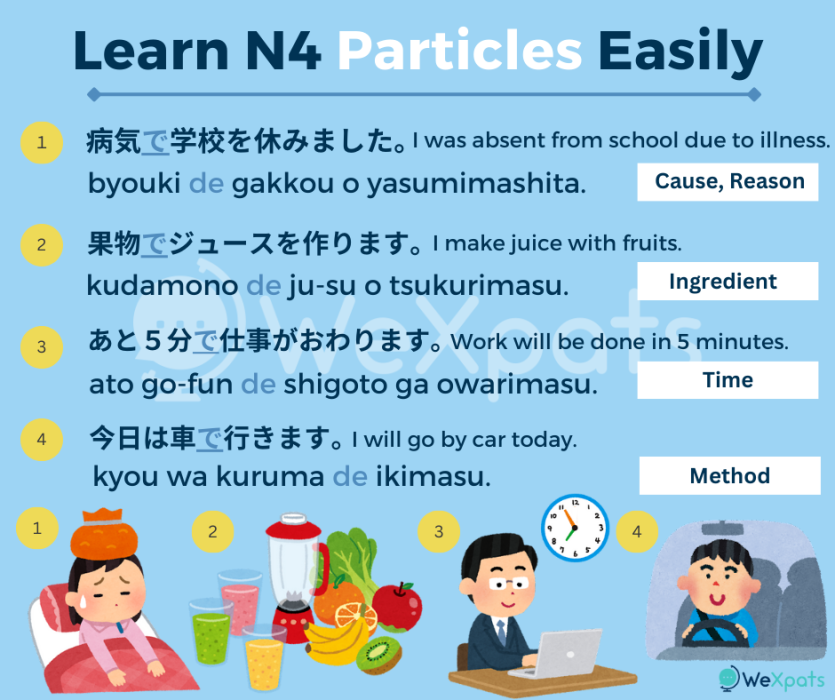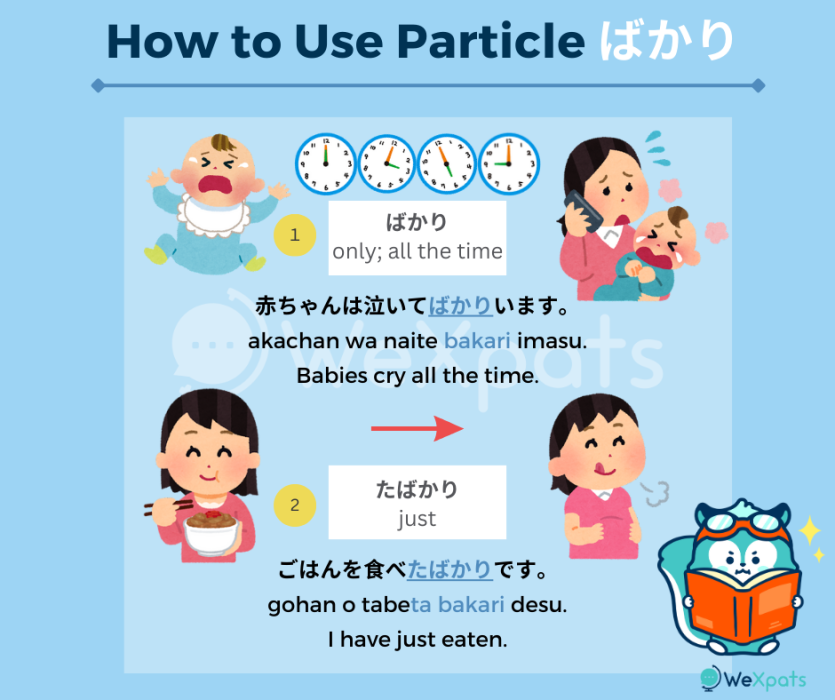Japanese particles include case markers, parallel markers, conjunctive particles, focus particles and compound case particles. In N5 Particles List, we explained the usage of fundamental particles like case markers. This time, we will go through the meaning and usage of N4 particles and challenge some example questions.
Table of Contents
- N4 Particles - Parallel Markers & Conjunctive Particles
- N4 Particles List
- How to Learn N4 Particles Easily
- Things to be Aware of about N4 Particles
- Challenge the N4 Particles Quiz!
N4 Particles - Parallel Markers & Conjunctive Particles
In addition to the case markers studied at N5 level, Parallel Markers and Conjunctive Particles also appear at N4 level. In this part, we will explain Parallel Markers and Conjunctive Particles that commonly appear in N4. Remember their meanings and usages.
並列助詞 (heiretsu joshi) - Parallel Markers
Parallel Markers are used to describe several nouns in relation to each other. There are 3 types of parallel markers:
-
全部列挙 (zenbu rekkyo) - Full Enumeration : to list out everything
-
一部列挙 (ichibu rekkyo) - Partial Enumeration : to list out some things
-
選択列挙 (sentaku rekkyo) - Selective Enumeration : to list out a selection of things
|
Parallel Marker |
Example Sentence |
Type |
|---|---|---|
|
「と」 |
米と野菜とパンを買います。 |
全部列挙 |
|
「とか~とか」 |
米とか野菜とかを買います。 |
一部列挙 |
|
「か」 |
米か野菜か、どちらを買うか教えてください。 |
選択列挙 |
終助詞 (shuu joshi) - Conjunctive Particles
Conjunctive Particles are attached to the end of a sentence, and are used to express the speaker’s emotions and feelings. Conjunctive Particles can be used to indicate a question, confirmation, communication, prohibition, or exclamation.
As they are added to the end of a sentence, remember them as particles that come before punctuation marks -「。」「?」「!」.
|
Conjuntive Particle |
Example Sentence |
Type |
|---|---|---|
|
「かな」 |
彼は明日来るのかな? |
Question |
|
「かしら」 |
友達も参加してるかしら? |
Question |
|
「かい」 |
明日の準備はおわったのかい。 |
Confirmation |
|
「な」 |
急に雨が降ってきて驚いたな。 |
Exclamation |
|
「な」 |
危ない場所には近づくな! |
Prohibition |
|
「よ」 |
疲れたから、少し休もうよ。 |
Communication |
Writer's Pick
N4 Particles List
This table summarises the particles found in N4 level. Let’s remember their meanings and usages by referring to the example sentences.
|
Particle |
How to Use |
Example Sentence |
|---|---|---|
|
とか~とか |
and the like |
母の日に、花とか、バッグとかをプレゼントした。 |
|
ば |
if |
7時に家をでれば、電車に間に合うでしょう。 |
|
より |
than |
私は、彼女より背が高い。 |
|
ばかり |
only; nothing but |
息子は、ゲームばかりしている。 |
|
たばかり |
just |
1か月前に日本に来たばかりです。 |
|
でも |
...or something |
子どもが寝ている間にコーヒーでも飲みませんか。 |
|
かしら |
I wonder; do you think? |
明日は雨かしら。 |
|
かい |
|
夕食はもう食べたのかい。 |
|
かな |
I wonder |
彼は元気にしているかな。 |
|
も |
(in addition / listing out) |
彼女は5日も学校を休んでいます。 |
|
な |
do not |
雨の日は川へ行くな ! |
|
など |
etc.; or something |
市内にマンションなどは買えない。 |
|
ながら |
while; during |
ご飯を食べながらテレビを見ます。 |
|
なら |
|
彼女が行くなら、私も行きます。 |
|
のに |
even though |
昨日ははやく寝たのに、まだ眠い。 |
|
のに |
for |
自転車は、せまい道を通るのに便利だ。 |
|
のは~だ |
[reason] is [result] |
1日10時間べんきょうするのは大変だ。 |
|
し |
and |
彼はべんきょうも得意だし、水泳も上手だし、 |
|
たら |
if |
彼が来なかったら、帰ります。 |
|
で |
due to; because of |
事故で電車が止まっています。 |
|
で |
made from |
ヨーグルトは牛乳で作ります。 |
|
で |
in |
あと、10分で試験が終わります。 |
|
で |
by |
駅まで自転車で行きます。 |
|
ても |
|
母に電話しても出なかった。 |
|
と |
and |
りんごとバナナとみかんを買います。 |
|
という |
called; named |
私のペットは、コロという名前です。 |
|
に |
to |
父に誕生日のプレゼントをあげます。 |
|
から |
made from |
日本酒は米から作ります。 |
|
までに |
by |
20日までに申し込み用紙を出してください。 |
|
か |
(uncertainty) |
荷物が届くのは、明日かあさってか分からない。 |
|
ので |
because of |
電車の事故があったので、授業に遅れた。 |
How to Learn N4 Particles Easily
The particle で (de) has multiple meanings. By adding で after a noun, it can express cause, make, time period, means, or method.

Things to be Aware of about N4 Particles
At the N4 level, the particles ながら (nagara), という (toiu), and ばかり (bakari) make an apperance. These particles are commonly used so remember them well. Also, note that particles do not change form as they are not conjugated, but when they are connected to other words, for example verbs, then the conjugated form of the verb will change.
ながら (nagara) - while
The particle ながら is used like so, “Verb ① + ながら + Verb ②”, for when performing 2 actions at the same time. Verb ① is conjugated to the polite form (ます), remove the ます, and attach ながら.
-
友達と一緒に歩きながら話します。[歩き
ます+ながら+話します]
(tomodachi to issho ni arukinagara hanashimasu)
- My friend and I talk while we walk.
という (toiu) - named / called
The particle という is used to introduce someone, or to tell or convey the name of an object or another person.
-
私の祖父は、山田太郎という名前です。
(watashi no sofu wa, Yamada Tarou toiu namae desu)
- My grandfather’s name is Yamada Tarou.
ばかり (bakari)
The particle ばかり can have 2 meanings.
ばかり (bakari) - ① Just After
To indicate the aftermath of an action. In this case, the verb (indicating the action) before ばかり needs to be in past form (た形).
-
彼女とは昨日会ったばかりです。[会う→ 会った + ばかり]
(kanojo towa kinou atta bakari desu)
- I just met her yesterday.
ばかり (bakari) - ② Only; Nothing But
To show limitations. In the case of nouns, ばかり follow immediately after. However, in the case of verbs, the verb before ばかり needs to be in present progressive form (て形).
-
暑いので水ばかり飲んでいる。 [水 (名詞 /noun) + ばかり]
(atsui node mizu bakari nondeiru)
- It’s hot, so I keep on drinking water. -
赤ちゃんは、いつも寝てばかりいる。[寝る→ 寝て + ばかり]
(akachan wa, itsumo nette bakari iru)
- Babies do nothing but sleep all the time.

Challenge the N4 Particles Quiz!
Let’s try answering these JLPT N4 Particles example questions.
問題:( )に入る助詞はどれですか。1・2・3・4の中からいちばんいいものを一つえらんでください。
Question ① 宿題は、10日( )だしてください。
1.から 2.まで 3.までに 4.でも
Question ②あまいもの( )食べているから体重が増えました。
1.しか 2.だけ 3.まで 4.ばかり
Question ③これは、紙( )作ったかざりです。
1.で 2.も 3.と 4.に
Question ④お昼ご飯は、おにぎり( )ラーメン( )を食べます。
※二つの( )には同じ語がはいります
1.しか 2.など 3.とか 4.と
【Quiz Translation and Answers】
Check how you did in the short quiz!
問題:( )に入る助詞はどれですか。1.2.3.4の中からいちばんいいものを一つえらんでください。
(mondai: ( )ni ireru joshi wa dore desuka? 1・2・3・4 no naka kara ichiban ii mono o hitotsu erande kudasai)
- Which particle should be used to fill in( )? Choose the best from 1・2・3・4 .
Question ① 宿題は、10日(3.までに)だしてください。
(shukudai wa, touka madeni dashite kudasai)
- Please submit the homework by the 10th.
Question ②あまいもの(4.ばかり)食べているから体重が増えました。
(amaimono bakari tabeteirukara taijuu ga fuemashita)
- My weight increased because I only eat sweet things.
Question ③これは、紙(1.で)作ったかざりです。
(kore wa, kami de tsukutta kazari desu)
- This is an ornament made from paper.
Question ④お昼ご飯は、おにぎり(3.とか)ラーメン(とか)を食べます。
(ohirugohan wa, onigiri toka ramen toka o tabemasu)
- I eat rice balls, ramen or the like for lunch.
Quiz Answers: [3], [4], [1], [3]



































